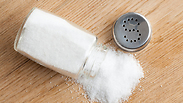
Do you like your food salty? Well, you may soon have to add salt to many products you buy in the supermarket. A new program initiated by the Health, Education and Culture ministries will obligate food manufacturers to significantly reduce the amount of sodium chloride in their products.
The new program is based on the link between excessive consumption of salt and different diseases. A high salt intake may increase a person's blood pressure and raises the risk of experiencing a stroke, heart diseases, blood vessel diseases, renal failure and other medical conditions.
The recommendations in Israel for sodium intake for adults is about 1,500 milligrams a day, and the maximum consumption limit is about 2,000 mg a day, which is the equivalent of a teaspoon. People suffering from heart diseases, elevated blood pressure, kidney diseases and other medical conditions must limit their salt intake even more.
For children, the recommended salt intake is even smaller. Children aged one to three should not consume more than 1.5 mg a day, children aged four to eight should not consume more than 1.9 mg a day, and children aged nine to 13 should consume up to 2.2 mg of salt a day.
Surveys conducted in recent years revealed a high salt intake in Israel: Children and youth consume 12.2 grams of salt a day, while adults consume 8.9 grams a day.
The three ministries' plan is to reduce the daily national consumption of salt by 3 grams by 2020. The plan's steering committee is working to reduce salt intake through education and by lowering the levels of sodium in processed food in cooperation with the food industry.
According to the plan, in the next two years the quantity of salt will be reduced by up to 10% in many types of food. Dairy products (soft cheese and cottage cheese) and salads (hummus, tahini and eggplant with mayonnaise) will lose up to 2.5% of their salt. The amount of salt will also be restricted in soups and casseroles.
Sauces and dressings will be less salty too: In ketchup, mayonnaise and light mayonnaise, the amount of salt will be reduced by 5%; soy sauce and teriyaky sauce will lose 10% of their salt; sweet chilli sauce and Thousand Island dressing will lose 5% of their saltiness. The amount of salt will also be reduced in soy sausages (5%), processed schnitzel, chicken and turkey cutlets, chicken sausages (10%) and pastrami (10%).
Popular salty snacks will soon have a different flavor. The salt intake in peanut snacks, chips, pretzels and crackers will be reduced by at least 5%, while the amount of salt in pizza, bourekas, cakes, biscuits and butter cookies will be cut by at least 6%.
The amount of salt will also be limited in canned food, nuts and seeds, jahnun (Yemenite pastry) and puff pastry.















